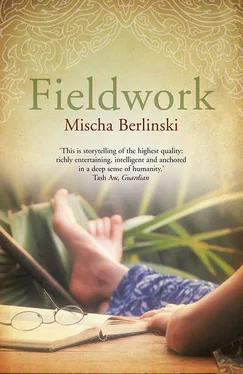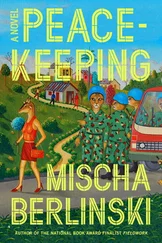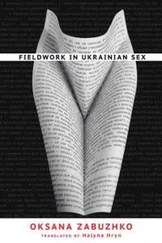Piers was increasingly concerned about his wife, Elena told me. He offered to take her back to Holland, but she refused: she detested the cold and she did not wish to bear the guilt of separating Piers from his work. "She did not like us," added Elena, a touch of bitterness in the old woman's scratchy voice. "It was too clear that she did not like our family." Her family's house in Malaysia had been destroyed. Areta hatched wild schemes: the family should go to Spain, she said. There was a copy of Don Quixote in her trunk of books. Or Morocco. Someplace it never rained. Piers wrote a letter to the university in Singapore, but there was no position available. Then, for a long while, the tone of Piers's letters changed. Areta had calmed herself, he wrote. Once again, she chattered about any old thing. She had started to learn the village songs. They had agreed that by the time Martiya was old enough for school, they would leave the village. Piers speculated that all the previous years of hysteria had been mourning for her family and lost world. Perhaps now the mourning had come to an end.
When Martiya was six years old, Areta died by drowning in the low river where the villagers bathed. Some speculated that she had slipped; others said that the pockets of her dress had been weighed down by heavy stones. It was the onset of the rainy season and the river was swollen high. Piers wrote to his sister that the villagers held a festival of darkness. A buffalo was slaughtered to ensure that the dead would have good eating and leave the living in peace. Two birds held in a bamboo cage were released. Martiya watched them circle over the village twice and fly off into the ebony forest.
A year after her death, Piers accepted a position as professor of linguistics at the University of California at Berkeley. He and Martiya packed up the little hut. They gave away almost everything to the villagers, even Areta's books, which were accepted gravely but with utter incomprehension by the Tobaku villagers, who, lacking a script for their own language, had little use for a hardcover edition of Pride and Prejudice on India paper.
Elena van der Leun told me one more thing: when Martiya left the village, she spoke Uma like a native. Within several years, she remembered the language only in occasional dreams. But for the rest of her life, if asked to state her ethnicity, either on a form or by someone curious about the origins of her round eyes, black hair, and flat features, she would always respond that she was topo'uma —a user of the Uma language, the same response any villager who lived near the mighty Lariang River in southern Kulawi District would have given.
I GOT BACK TO CHIANG MAIand wrote my piece about the sculptor, then for the Bangkok Times I wrote fifteen hundred words about a jazz trio that played nightly in the lobby of the Amari Hotel. I phoned both the Dutch and the American consulates, looking for details into Martiya's case, but neither consul had much to tell me: official records of both governments were sealed; the personnel who might have recalled details of her case had long since transferred to new posts. She must have been represented by a lawyer at trial, I figured, but I had no idea how to find him; I called another lawyer, who informed me that the details of legal proceedings in Thailand are not available to the public. Elena van der Leun had told me all that she could: her biography of Martiya ended effectively at age six, with Martiya's arrival in California. Piers spent the rest of his career at Berkeley, but Elena did not know much beyond that: there had been a fight over an inheritance; Martiya had been very far away. I let the story slide.
Martiya's story interested me, but Thailand was full of strange stories and inexplicable mysteries: one morning when I woke up, from my balcony I found a troupe of elephants marching through the neighborhood, led by a wiry mahout; a baby elephant looked at me with huge, curious eyes; and then the elephants disappeared from view past the bend in the road that led toward the Westin Hotel. I couldn't explain the elephants either, or why they were walking around my middle-class Chiang Mai suburb. That fall, Rachel explained to chubby Morris how to add up numbers, even big ones, and she tried to teach Maria how to tell time, who found the whole business so tricky that for a while just looking at a clock was an invitation to tears. When the class arrived at the unit on families, Najda, a little angel who took great delight in ratting out the wrongdoings of the other children, gravely explained to Miss Rachel that she lived with her mommy from Thailand and her other mommy from Malaysia and her daddy from America all in the same house; the situation, Najda explained with precocious tact, was "very sensitive." There was a haunted house for Halloween, until the third-graders got too rambunctious and stepped on the papier-mâché ghosts and had to have a time-out; on the first full moon in November, like everyone in Thailand, we thanked the spirits of the waters by decorating hearts-of-palm kratong with flowers, incense, and candles and setting them adrift on the muddy-brown river.
The rainy season tapered off and the cool season began: the cool season is northern Thailand's spring, and Chiang Mai was filled with flowers — glorious orange trumpet, which snaked along the garden wall, and aromatic hibiscus, a half-dozen varieties of lily, and everywhere delicate golden lantana, tender clumps of brilliant red and orange, climbing up telephone poles and sprouting miraculously in the sewage-occluded gutters. Rachel wore frangipani in her hair, until told that in Thailand that flower was reserved for mourning. Then for about two weeks in early December, the city was overwhelmed by butterflies taking advantage of the brief interval between the pounding rain of the monsoon and the punishing sun of the hot season to mate and die.
But Josh's vivid description of Martiya, the idea of a murdering anthropologist carefully constructing field notes while in a Thai prison, and the only white woman who could rightfully call herself topo'uma — all these lingered with me. On Friday afternoons, I picked Rachel up at school with the motorcycle. School let out at half past two; the last lingering thunderstorms of the monsoon broke at three; and by four the roads were dry enough to drive. We'd head out into the hills. We took the ring road past the fast-food restaurants and the large open lots where vendors sold spirit houses and giant bronze Buddhas; past Carrefour, the mammoth French hypermarché ; past one mall, then the other. Then, just at the edge of the first rice paddies, we passed the prison where Josh had met Martiya and Martiya had died. Seeing the squat building with the limp, rain-drenched Thai flag inspired in me an indistinct sense of guilt, like the time my grandmother gave me an amaryllis that I forgot to water.
In December, Rachel and I went back to her family's house in Seattle for Christmas. Her whole family was there, all of her sisters, and the twins. Every day it rained, except for the day it hailed, and the sky lay close to the ground like a coffin lid. Rachel's father took me aside to ask, man to man, when I was going to get a real job. Martiya's story gave me an excuse to escape. Just after the New Year, I flew down to California.
Piers van der Leun today can be found on the twelfth floor of Dwinelle Hall of the University of California at Berkeley, where he stands guard in the early mornings, surrounded by the other linguists emeriti who have their photographs on the wall outside of the secretary's office. All the dead linguists gather here in the early mornings to smoke their pipes and drink honeyed tea and babble in all the world's languages. One mentions reciprocal constructions in Bantu, and another replies that a similar grammatical structure is found, oddly enough, in Ojibwe. Their incorporeal forms drift down the hallway and settle in the department lounge, where the former authority on the phonology of the Indo-Turkic languages laments the difficulty of returning to his fieldwork. All the ghosts nod companionably: they know how difficult it is to discipline oneself in the afterlife, now that time is no longer an issue and tenure guaranteed. The recently arrived specialist in computational linguistics spills his coffee, and when the graduate students, caught in their own particular netherworld between life and death, arrive later in the day, they find the dark puddle and wonder who might have made such a mess.
Читать дальше












